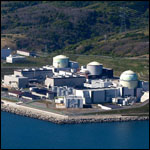Japan's Tomari Reactor First To Go Back Fully Online Since 3/11 Japan Times
A reactor at the Tomari nuclear power plant in Hokkaido became the first to resume full commercial operation since the disaster at the Fukushima No. 1 plant after Hokkaido Gov. Harumi Takahashi officially gave her approval Wednesday.
|
|
|
Darius Dixon | Politico
NRC Chairman Gregory Jaczko regularly faces the sharp end of Republican spears for his work to shut down the Yucca Mountain nuclear waste repository, but his biggest clash appears not to be with Capitol Hill but with fellow NRC Commissioner Kristine Svinicki. Jaczko, a Democrat and former aide to Senate Majority Leader Harry Reid, and Svinicki, a Republican, have sparred over everything from serious issues including safety reviews and agency budgets to minor items like foreign travel requests. Full Article
Dean Cheng | Heritage Foundation
In recent years, China has made great strides in its space program. Growing Chinese counterspace capabilities are beginning to threaten U.S. space superiority and therefore the ability of the U.S. to support its friends and allies and to deter aggression. To deal with the challenge, the U.S. should maintain and expand robust space capabilities, develop alternatives to space-based systems to reduce American vulnerability, and increase U.S. knowledge and understanding of Chinese space capabilities. Full Article
Gulf Times
Russia and Iran yesterday said a new Russian plan had a real chance of solving the standoff over the Iranian nuclear drive, despite the failure of past initiatives to end a decade of deadlock. Russian Foreign Minister Sergei Lavrov welcomed his Iranian counterpart Ali Akbar Salehi in Moscow to discuss the details of a "step-by-step" plan that rewards Tehran for greater transparency with a gradual easing of UN sanctions. Full Article
Scott A. Snyder | Council on Foreign Relations
Since before the sinking of the Cheonan in March of 2010, the People's Republic of China has been pushing a three-step formula for resumption of Six Party Talks: resume inter-Korean dialogue, resume high-level U.S.-DPRK contacts through a visit by Vice Minister Kim Kye-gwan to the United States, and reconvene Six Party Talks in Beijing. The first two steps were accomplished in relatively short order at the end of July. Full Article
Gökhan Kurtaran | Hürriyet Daily News
Turkey has lost time with its negotiations with Japan on the plans to build a nuclear power plant in Sinop, and it has decided to negotiate with other countries as well, an Energy Ministry official told the Hürriyet Daily News. Finnish nuclear operators are also among the possible candidates. "We have lost time while negotiating with Japan," the ministry's press undersecretary, Ali Eskigün, said. Full Article
|

